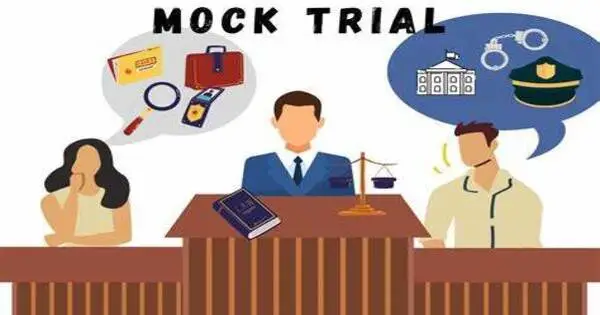A mock trial is a trial that is performed or imitated. Mock trials are similar to moot courts in that they simulate lower-court trials, whereas moot courts simulate appellate court hearings. Attorneys preparing for a real trial may conduct a mock trial with volunteers acting as role players to test theories or experiment with one another.
Mock trial is also the name of an after-school program in which students compete in rehearsed trials to learn about the legal system. Mock trials are held at all levels of education, including primary school, middle school, high school, college, and law school.
Here are the key components of a mock trial:
- Case: A fictional legal case is created, usually based on a real-life scenario or legal issue. This case serves as the foundation for the trial.
- Roles: Participants take on various roles, including attorneys (prosecution/plaintiff and defense), witnesses, and sometimes a judge. Attorneys present their arguments, witnesses testify, and the judge ensures proper courtroom procedure.
- Preparation: Participants must thoroughly prepare their roles. Attorneys need to craft opening statements, examine and cross-examine witnesses, and present closing arguments. Witnesses must understand their character’s background and testimony.
- Procedure: The mock trial follows a similar structure to a real trial. It begins with opening statements, followed by witness testimonies, cross-examinations, and closing arguments.
- Judges and Scoring: If there is a judge, they may evaluate the participants’ performance based on their legal arguments, courtroom presence, and adherence to procedure. Some mock trials also have scoring systems for individual performances.
- Debate and Argumentation: A significant aspect of a mock trial is the art of argumentation. Attorneys must present compelling cases, using evidence and legal reasoning to support their arguments.
- Learning Objectives: These provide participants with the opportunity to learn about the legal system, research, critical thinking, public speaking, and teamwork. They also teach participants how to think on their feet and adapt to unexpected situations.
Mock trial is frequently taught in conjunction with a trial advocacy course or as an after-school enrichment activity. Some gifted and talented programs may take place in one as well. Mock trials can be held at various levels, ranging from middle and high schools to colleges and law schools. They provide students with a hands-on opportunity to learn about the legal system and develop important legal and advocacy skills.
















